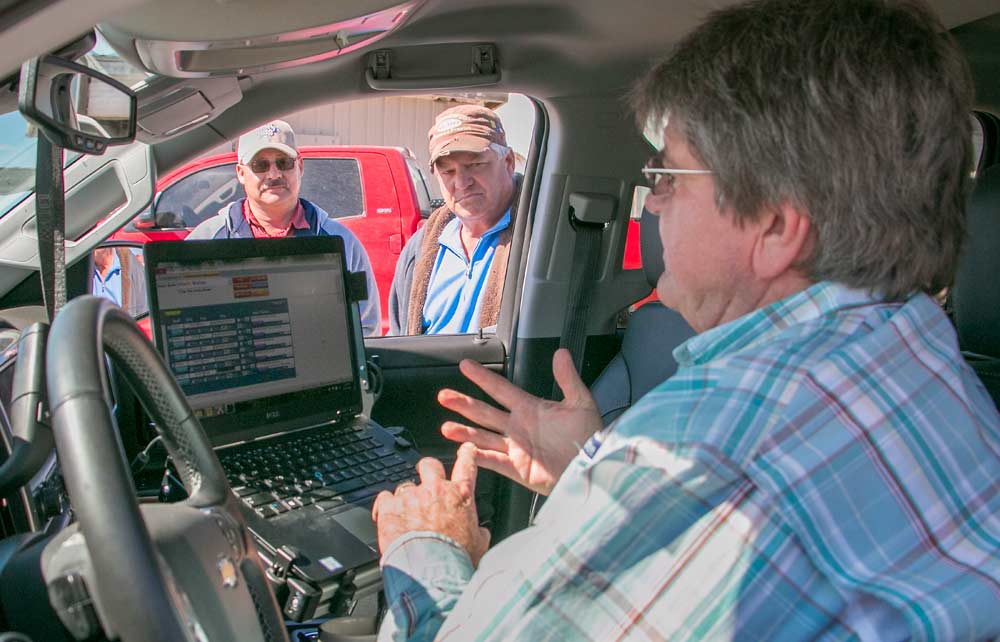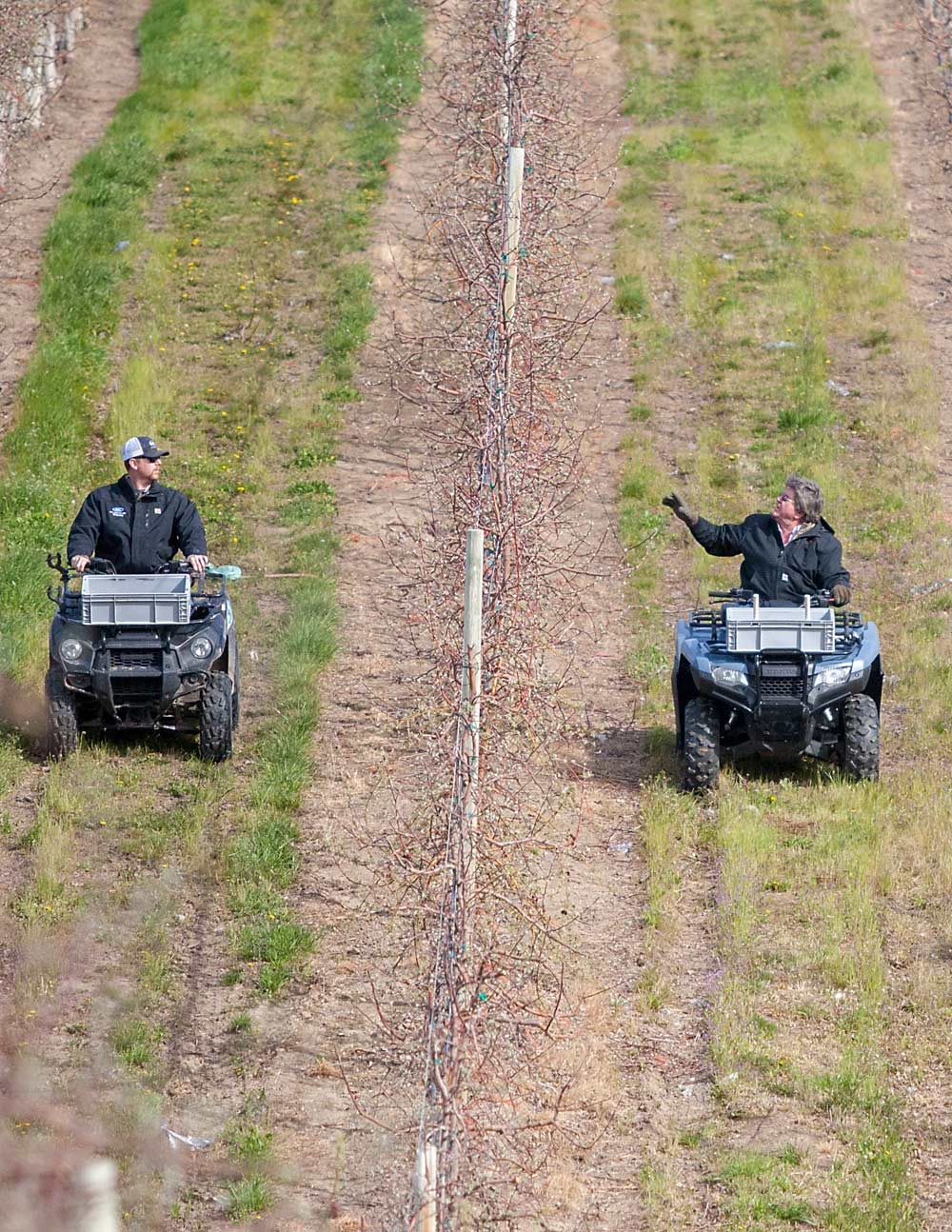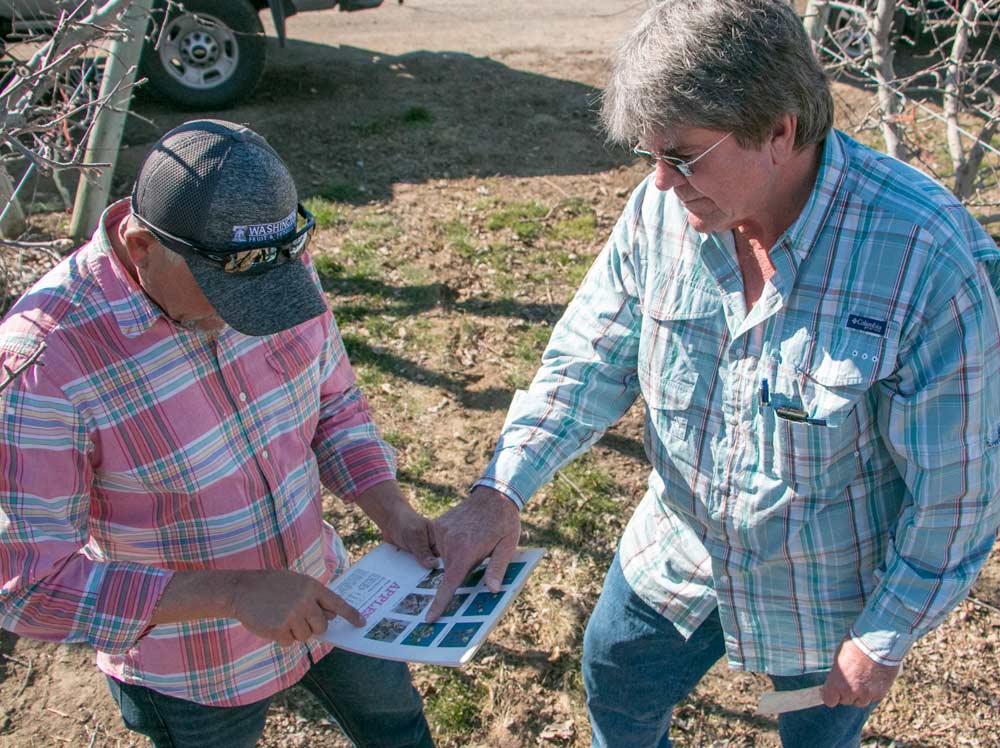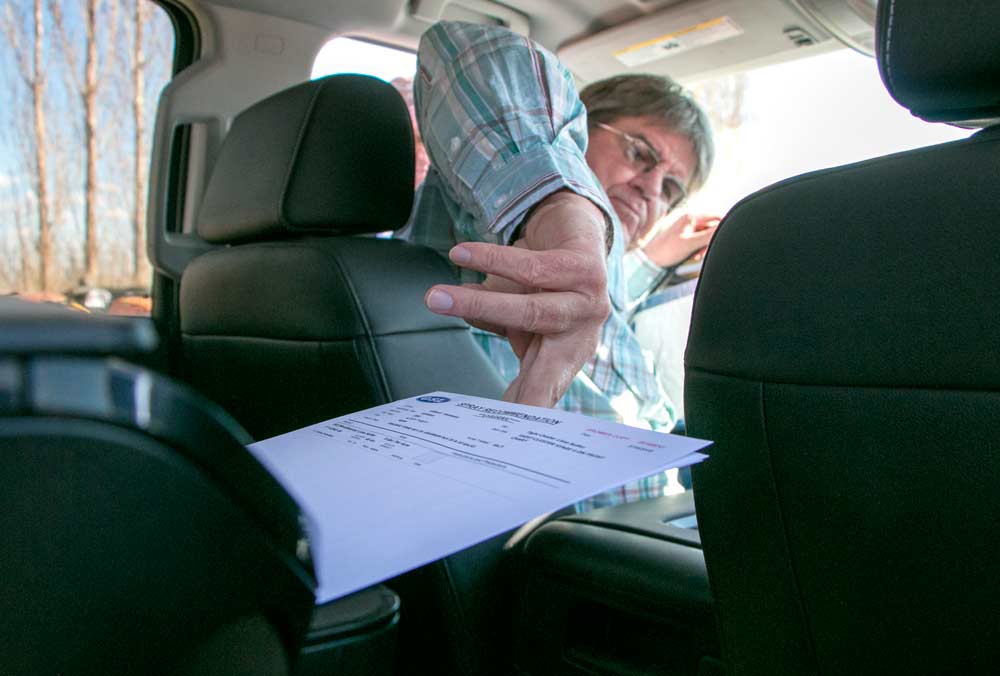
Dan Griffith, a longtime tree fruit consultant for G.S. Long, discusses dormancy sprays, soil supplements, upcoming bloom and other horticultural issues with Randy Newman, right, ranch manager, and Ignacio Martinez, the foreman, in mid-March at a Gilbert Orchards farm near Mattawa, Washington. As the tree fruit industry grows more complex and university extension programs take a more regional approach, growers are expecting more from their consultants. (Ross Courtney/Good Fruit Grower)
As Dan Griffith of G.S. Long operates the laptop in his Chevrolet Silverado, Randy Newman and Ignacio Martinez of Gilbert Orchards lean on his windows and discuss mid-March dormant sprays with buds at 1/2-inch green at the ranch near Othello, Washington.
Satisfied, Griffith clicks print, reaches into his backseat and retrieves the stack of recommendations from a Hewlett-Packard printer hardwired to his vehicle with a 12-volt adapter. He also carries around boxes of files.
As horticulture becomes more complex and university extension services take more regional approaches to education, growers are relying more heavily on commercial crop consultants like Griffith, who has 40 years in the business between Wilbur-Ellis and G.S. Long.
Meanwhile, consultants also sometimes now lead farm tours, host workshops, run trials and speak at conferences and field days, going beyond their traditional work of serving clients.
So morph the lines of private and public in the tree fruit industry, saddled with ever-changing regulations, more intricate science, increasing varieties of cultivars and rootstocks and new pest and disease pressures.
For one, their recommendations now must adhere to Global GAP or other third-party verifiers. Another change is that farms are bigger with more complex ownership.
Griffith often prints out several copies of the same recommendations with only the name of the orchard changing because families sometimes have a variety of LLCs or partnerships for different portions of the same farm. Each needs its own paper trail.
Another change: The quad.
Griffith started when orchards were smaller and he could simply walk the rows to learn what he needed to, “which was much better for us physically,” he said with a laugh.
In 1982, he convinced his employer to issue him a Honda 110 Trail motorcycle, mounted to the front of his car. Today, he carries a Honda 420 four-wheeler in the bed of his pickup.

Griffith, right, uses his four-wheeler to evaluate return bloom on a Gala block with trainee Grayson Byers in late March in Roosevelt, Washington. (Ross Courtney/Good Fruit Grower)
Corresponding changes in extension
Running trials, speaking at conferences and hosting tours, crop consultants are taking on some of the tasks once left to the county extension agents of land grant universities. Today, counties sometime contribute less to extension services while university extension faculty take on more sophisticated specialized roles and reach growers through collaborations with other industry groups.
Extension faculty members cover wider geographic regions, face higher expectations of scholarship and often must chase their own funding through grant programs, said Karen Lewis, a 30-year Washington State University tree fruit extension specialist in Moses Lake.
The specialists sometimes operate their own laboratories, oversee graduate students and serve on industry boards and commissions.
Lewis serves as the education director of the International Fruit Tree Association. They and the universities they represent can no longer justify some of their tasks of the past.
Thus, private consultants get more questions. Some companies have asked Lewis and her extension colleagues to develop basic and applied horticultural training for their new consultants to help fill in their knowledge gaps.
Extension specialists need help too sometimes, she said. “Basically, all of us are expected to be well versed in all areas of production, and that is unrealistic. We need to specialize, and we need to know who to send people to for answers to some questions. Growing tree fruit is a complex puzzle, and it takes several experts to get all the pieces in the right place.”

Griffith, right, and orchard manager Antonio Martinez discuss the stages of bud progression in mid-March at the Jayhawk Orchard near Othello, Washington. (Ross Courtney/Good Fruit Grower)
Lewis has been in her role for 30 years. When she started, the university’s tree fruit extension team included six full-time specialists.
Today, that’s down to three, plus some faculty members who spread their responsibilities with other commodities.
However, today the university partners with the Washington Tree Fruit Research Commission, Washington State Department of Agriculture and the Washington State Tree Fruit Association to round out some of their outreach efforts.
In New York, Cornell Cooperative Extension has two horticulture teams. The Lake Ontario program, for example, has four specialists for the entire Western New York region.
Decades ago, each county had that many people.
In the East
Still, the line exists.
“In most cases, it’s not the extension agent’s role to focus on individual growers at the expense of educating and transferring information to the overall grower community as a whole, whereas focusing on specific grower clients is of course exactly what we are paid to do,” said Jeff Alicandro, president and owner of agr.assistance in New York, a 34-year crop consultant based in North Rose of Wayne County, New York.
In addition to tree fruit production consulting, Alicandro’s company conducts numerous crop nutrient and pest management trials, speaks at workshops, mails newsletters and holds the annual Wayne County Fruitgrower Tour in early August attended by 400 or more growers and industry personnel.
Few consultants have seen as much industry change as Alicandro and Jim Eve, an independent consultant who also serves Wayne County growers. “The two heaviest points are, we start earlier and we end later,” he said.
His work begins earlier in the spring, in winter in fact, and stretches past the beginning of harvest into September due to climate changes, new nuances of pest and disease pressures and more emphasis on fresh markets. He also finds himself writing more recommendations for soil nutrition.
The stakes are higher, too. Much higher. Orchardists used to plant 27 trees per acre; now they ask him to make recommendations for 1,000 or 1,500 trees per acre. “There’s no forgiveness in these systems now,” he said.
Like many consultants, his work goes beyond the one-on-one interaction with his clients. He speaks at fruit schools and collaborates with Cornell University’s extension services. In fact, he once worked as a Cornell research assistant in plant pathology.
He still attends weekly meetings with researchers and extension specialists, monitors abandoned blocks for apple maggot and sends out weekly newsletters about growing degree-day accumulation, pest trap counts and growth updates at some of his trial blocks. These efforts go beyond just his clients.
Eve also worries that not enough new people are entering his field. The job market in agriculture is pretty hot right now, while both he and his colleagues are nearing retirement age. He knows of young people only a year out of college being offered jobs for $60,000 per year. He has trouble competing with that.
He strongly suggests universities and companies start creating apprenticeship programs to ease young people into the work. “You can’t decide the day you graduate from college you’re going to be a crop consultant,” he said.
Eve also worries that crop consultants are under more pressure to sell products than in the past, one of the reasons he has spent most of his career unaffiliated with a supply company. He suspects some are selling products growers don’t really need.
“I’m not real pleased with the state of the industry,” he said.

Griffith performs a lot of his work from his “office,” a Chevrolet Silverado with a laptop, Wi-Fi and a printer hardwired with a 12-volt adapter. (Ross Courtney/Good Fruit Grower)
Crop consultants who do represent supply and service companies have to avoid overselling, too — commonly referred to as “loading up” — if they want to last in the industry, said Griffith of G.S. Long.
Most of the products he recommends don’t need salesmanship, he countered; the growers buy a lot anyway. In fact, one of his clients near Othello during his mid-March bloom spray rounds asked him for an herbicide recommendation. The customer is the one who brought it up and almost had to talk Griffith into it.
“You get accused of loading somebody up and it’ll hurt you bad,” he said. “In this industry, you have to do what’s best for the grower or otherwise you won’t be in business. Word travels fast.” •
—by Ross Courtney






Leave A Comment